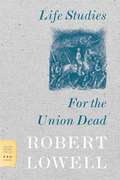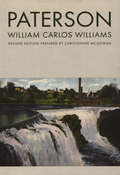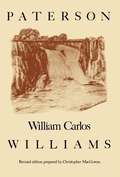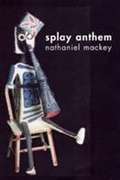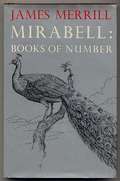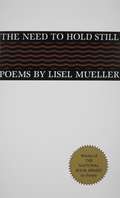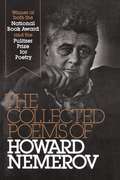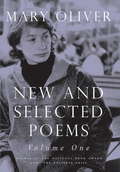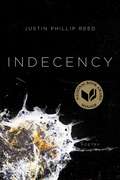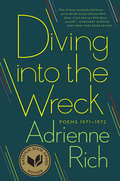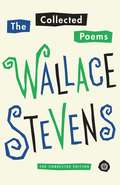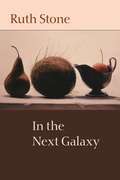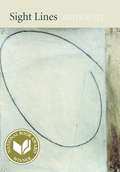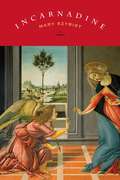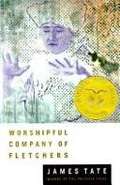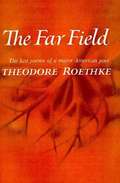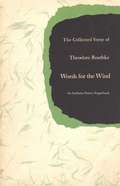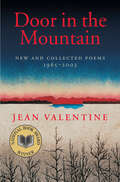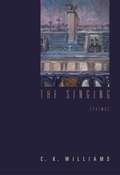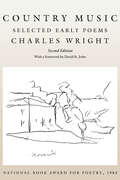Special Collections
National Book Award Winners - Poetry
- Table View
- List View
Life Studies and For the Union Dead
by Robert LowellThe title poem of For the Union Dead concerns the death of the Civil War hero (and Lowell ancestor) Robert Gould Shaw, but it also largely centers on the contrast between Boston's idealistic past and its debased present at the time of its writing, in the early 1960's. Throughout, Lowell addresses contemporaneous subjects in a voice and style that themselves push beyond the accepted forms and constraints of the time.
Winner of the National Book Award
Paterson
by William Carlos Williams and Christopher MacgowanLong recognized as a masterpiece of modern American poetry, WIlliam Carlos Williams' Paterson is one man's testament and vision, "a humanist manifesto enacted in five books, a grammar to help us life" (Denis Donoghue). Paterson is both a place--the New Jersey city in whom the person (the poet's own life) and the public (the history of the region) are combined. Originally four books (published individually between 1946 and 1951), the structure ofPaterson (in Dr. Williams' words) "follows the course of the Passaic River" from above the great falls to its entrance into the sea. The unexpected Book Five, published in 1958, affirms the triumphant life of the imagination, in spite of age and death. This revised edition has been meticulously re-edited by Christopher MacGowan, who has supplied a wealth of notes and explanatory material.
Paterson
by William Carlos Williams and Christopher J. MacgowanLong recognized as a masterpiece of modern American poetry, William Carlos Williams' "Paterson" is one man's testament and vision. "Paterson" is both a place -- the New Jersey city near which Williams lived -- and a man: the symbolic figure in whom the person (the poet's own life) and the public (the history of the region) are combined.
Winner of the National Book Award
Splay Anthem
by Nathaniel MackeyIn a stunning new collection of poems of transport and transcendence, African-American poet Nathaniel Mackey's "asthmatic song of aspiration" scuttles across cultures and histories from America to Andalucía, from Ethiopia to Vienna in a sexy, beautiful adaptive dance. Part antiphonal rant, part rhythmic whisper, Nathaniel Mackey's new collection of poems, Splay Anthem, takes the reader to uncharted poetic spaces. Divided into three sections "Braid," "Fray," and "Nub" (one referent Mackey notes in his stellar Introduction: "the imperial, flailing republic of Nub the United States has become, the shrunken place the earth has become, planet Nub") Splay Anthem weaves together two ongoing serial poems Mackey has been writing for over twenty years. In the cosmology of the Dogon of West Africa, the Andoumboulou are progenitor spirits, and the song of the Andoumboulou is a song addressed to the spirits, a funeral song, a song of rebirth. "Mu," too, splays with meaning: muni bird, Greek muthos, a Sun Ra tune, a continent once thought to have existed in the Pacific. With the vibrancy of a Miró painting, Mackey's poems trace the lost tribe of "we" through waking and dream time, through a multitude of geographies, cultures, histories, and musical traditions, as poetry here serves as the intersection of everything, myth's music, spirit lift.
Winner of the National Book Award
The Collected Poems of Howard Nemerov
by Howard NemerovThe former Poet Laureate of the United States, Nemerov gives us a lucid and precise twist on the commonplaces of everyday life.The Collected Poems of Howard Nemerov won both the National Book Award and the Pulitzer Prize in 1978. "Howard Nemerov is a witty, urbane, thoughtful poet, grounded in the classics, a master of the craft. It is refreshing to read his work. . . . "—Minneapolis Tribune "The world causes in Nemerov a mingled revulsion and love, and a hopeless hope is the most attractive quality in his poems, which slowly turn obverse to reverse, seeing the permanence of change, the vices of virtue, the evanescence of solidities and the errors of truth."—Helen Vendler, New York Times Book Review
New and Selected Poems, Volume One
by Mary OliverWhen New and Selected Poems, Volume One was originally published in 1992, Mary Oliver was awarded the National Book Award. In the fourteen years since its initial appearance it has become one of the best-selling volumes of poetry in the country. This collection features thirty poems published only in this volume as well as selections from the poet's first eight books.
Mary Oliver's perceptive, brilliantly crafted poems about the natural landscape and the fundamental questions of life and death have won high praise from critics and readers alike. "Do you love this world?" she interrupts a poem about peonies to ask the reader. "Do you cherish your humble and silky life?" She makes us see the extraordinary in our everyday lives, how something as common as light can be "an invitation/to happiness,/and that happiness,/when it's done right,/is a kind of holiness,/palpable and redemptive." She illuminates how a near miss with an alligator can be the catalyst for seeing the world "as if for the second time/the way it really is." Oliver's passionate demonstrations of delight are powerful reminders of the bond between every individual, all living things, and the natural world.
Winner of the National Book Award
Indecency
by Justin Phillip ReedIndecency is boldly and carefully executed and perfectly ragged. In these poems, Justin Phillip Reed experiments with language to explore inequity and injustice and to critique and lament the culture of white supremacy and the dominant social order. Political and personal, tender, daring, and insightful--the author unpacks his intimacies, weaponizing poetry to take on masculinity, sexuality, exploitation, and the prison industrial complex and unmask all the failures of the structures into which society sorts us.
Diving into the Wreck
by Adrienne RichIn her seventh volume of poetry, Adrienne Rich searches to reclaim--to discover--what has been forgotten, lost, or unexplored.
"I came to explore the wreck. / The words are purposes. / The words are maps. / I came to see the damage that was done / and the treasures that prevail." These provocative poems move with the power of Rich's distinctive voice.
Winner of the National Book Award
The Collected Poems of Wallace Stevens
by Wallace StevensThis definitive poetry collection, originally published in 1954 to honor Stevens on his 75th birthday, contains:
- "Harmonium"
- "Ideas of Order"
- "The Man With the Blue Guitar"
- "Parts of the World"
- "Transport Summer"
- "The Auroras of Autumn"
- "The Rock"
Winner of the National Book Award
In the Next Galaxy
by Ruth StoneRuth Stone writes with crackling intelligence from the vantage point of an aging and impoverished woman. Wise, sardonic, crafty, and misleadingly simple, Stone loves heavy themes but loathes heavy poems.
Winner of the National Book Award
Sightlines
by Arthur SzeFinalist for the 2019 National Book AwardFrom the current phenomenon of drawing calligraphy with water in public parks in China to Thomas Jefferson laying out dinosaur bones on the White House floor, from the last sighting of the axolotl to a man who stops building plutonium triggers,Sight Lines moves through space and time and brings the disparate and divergent into stunning and meaningful focus. In this new work, Arthur Sze employs a wide range of voices--from lichen on a ceiling to a man behind on his rent--and his mythic imagination continually evokes how humans are endangering the planet; yet, balancing rigor with passion, he seizes the significant and luminous and transforms these moments into riveting and enduring poetry.
Incarnadine
by Mary SzybistIn Incarnadine, Mary Szybist restlessly seeks out places where meaning might take on new color. One poem is presented as a diagrammed sentence. Another is an abecedarium made of lines of dialogue spoken by girls overheard while assembling a puzzle. Several poems arrive as a series of Annunciations, while others purport to give an update on Mary, who must finish the dishes before she will open herself to God. One poem appears on the page as spokes radiating from a wheel, or as a sunburst, or as the cycle around which all times and all tenses are alive in this moment. Szybist's formal innovations are matched by her musical lines, by her poetry's insistence on singing as a lure toward the unknowable. Inside these poems is a deep yearning-for love, motherhood, the will to see things as they are and to speak. Beautiful and inventive, Incarnadine is the new collection by one of America's most ambitious poets.
Winner of the 2013 National Book Award for Poetry
An NPR, Slate, Oregonian, Kansas City Star, Willamette Week, and Publishers Weekly Best Book of the Year * Amazon's Best Book of the Year in Poetry 2013 *
Worshipful Company of Fletchers
by James TateMasterfully drawing on a variety of voices and characters, James Tate joyfully offers his first book since winning the Pulitzer Prize in 1992 for his "Selected Poems."
Winner of the 1994 National Book Award for poetry.
The Far Field
by Theodore RoethkeWith Roethke's sudden, tragic death in 1963, a great poetic career was brought to an untimely end. "The Far Field" presents the most rewarding of his many volumes of poetry, both in brilliance of style and inner meaning. All of the poems have appeared previously in periodicals such as "The Atlantic Monthly, Harper's, Ladies' Home Journal, The New Yorker", and "The Partisan Review".
Winner of the National Book Award
Words for the Wind
by Theodore RoethkeA collection of the Northwest poet's work up until 1958, which won the National Book Award in 1959. Roethke taught poetry and writing at the University of Washington.
Door in the Mountain
by Jean ValentineThis National Book Award–winning volume presents nearly forty years of the renowned poet&’s work. Between 1965 and 2003, Jean Valentine published nine critically acclaimed collections of poetry, including Dream Barker(winner of the Yale Younger Poets Award), Ordinary Things, and The River at Wolf. Spare and intensely-felt, Valentine&’s poems present experience as only imperfectly graspable. This volume gathers together all of Valentine's published poems, presenting them alongside a stunning new collection. Valentine&’s poetry is as recognizable as the slant truth of a dream. She is a brave, unshirking poet who speaks with fire on the great subjects―love, and death, and the soul. Her images―strange, canny visions of the unknown self―clang with the authenticity of real experience. This is an urgent art that wants to heal what it touches, a poetry that wants to tell, intimately, the whole life.
The Singing
by C. K. WilliamsNew work from the Pulitzer Prize winning author of Repair.
Reality has put itself so solidly before me there's little need for mystery. Except for us, for how we take the world to us, and make it more, more than we are, more even than itself. --from "The World"
In his first volume since Repair, C. K. Williams treats the characteristic subjects of a poet's maturity--the loss of friends, the love of grandchildren, the receding memories of childhood, the baffling illogic of current events--with an intensity and drive that recall not only his recent work but also his early books, published forty years ago. He gazes at a Rembrandt self-portrait, and from it fashions a self-portrait of his own. He ponders an "anatomical effigy" at the Museum of Mankind, an in so doing "dissects" our common humanity. Stoking a fire at a house in the country, he recalls a friend who was burned horribly in war, and then turns, with eloquence and authority, to contemporary life during wartime, asking "how those with power over us can effect these things, by what cynical reasoning do they pardon themselves." The Singing is a direct and resonant book: touching, searching, heartfelt, permanent.
The Singing is the winner of the 2003 National Book Award for Poetry.
Country Music
by Charles WrightA compilation of powerful and moving poems from early in the poet's career. Co-winner of the 1983 National Book Award for Poetry, Country Music is comprised of eighty-eight poems selected from Charles Wright's first four books published between 1970 and 1977. From his first book, The Grave of the Right Hand, to the extraordinary China Trace, this selection of early works represents "Charles Wright's grand passions: his desire to reclaim and redeem a personal past, to make a reckoning with his present, and to conjure the terms by which we might face the future," writes David St. John in the forward. These poems, powerful and moving in their own right, lend richness and insight to Wright's recently collected later works. "In Country Music we see the same explosive imagery, the same dismantled and concentric (or parallel) narratives, the same resolutely spiritual concerns that have become so familiar to us in Wright's more recent poetry," writes St. John.
